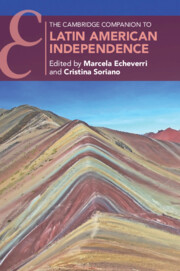Book contents
- The Cambridge Companion to Latin American Independence
- The Cambridge Companion to Latin American Independence
- Copyright page
- Dedication
- Contents
- Figures
- Maps
- Contributors
- Acknowledgments
- Maps
- Introduction
- 1 On the Origins of Latin American Independence
- 2 Constitutionalism and Representation in Ibero-America during the Independence Processes
- 3 Foreign Interaction and the Independence of Latin America
- 4 Public Opinion and Militarization during the Wars of Independence
- 5 Natural Histories of Remembrance and Forgetting
- 6 Brothers in Arms
- 7 Beyond Heroes and Heroines
- 8 Views of the Latin American Independences from the Iberian Peninsula
- 9 Shades of Unfreedom
- 10 Early Liberalism
- Bibliography
- Index
4 - Public Opinion and Militarization during the Wars of Independence
Published online by Cambridge University Press: 16 March 2023
- The Cambridge Companion to Latin American Independence
- The Cambridge Companion to Latin American Independence
- Copyright page
- Dedication
- Contents
- Figures
- Maps
- Contributors
- Acknowledgments
- Maps
- Introduction
- 1 On the Origins of Latin American Independence
- 2 Constitutionalism and Representation in Ibero-America during the Independence Processes
- 3 Foreign Interaction and the Independence of Latin America
- 4 Public Opinion and Militarization during the Wars of Independence
- 5 Natural Histories of Remembrance and Forgetting
- 6 Brothers in Arms
- 7 Beyond Heroes and Heroines
- 8 Views of the Latin American Independences from the Iberian Peninsula
- 9 Shades of Unfreedom
- 10 Early Liberalism
- Bibliography
- Index
Summary
This chapter analyzes the formation and expansion of social spaces for political debate and their impact on the formation of political identities as well as its entanglements with an increasing militarization of society. This chapter studies how the military quarters, the camps, and the campaign regiments transformed themselves into privileged spaces for public debate. During the process of Independence, the military forces engaged more in political debates, and members of these forces expressed their political opinions and affiliations in broadsides, manifestos, and printed proclaims. By bringing these often separated social and political spaces, we seek to analyze the impact and relevance that public opinion had in the processes of independence, paying particular attention to the formation of political identities, the emergence of a new political languages, as well as the diverse discursive strategies that leaders in different regions used to mobilize people militarily or to raise political awareness on soldiers. In this way, this chapter seeks to create original analytical connection between political knowledge and debate, and military mobilization in Latin America during the wars of independence.
- Type
- Chapter
- Information
- The Cambridge Companion to Latin American Independence , pp. 120 - 152Publisher: Cambridge University PressPrint publication year: 2023

